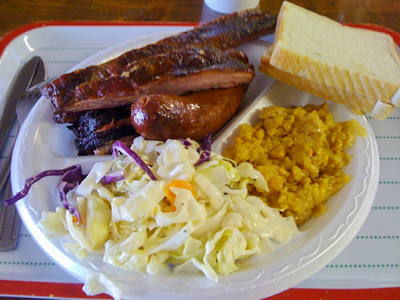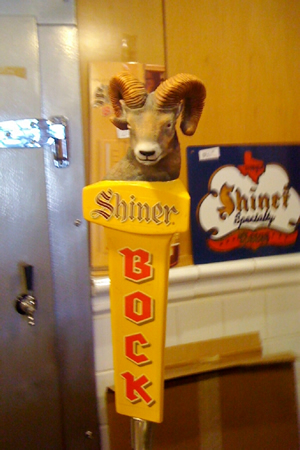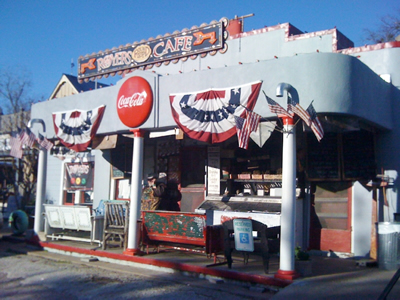Saturday, February 12, 2011.
Eating Under The X And The A In Texas.
Breakfast in the St. Regis Hotel's restaurant consisted of a fruit plate, a croissant, juice and coffee for only $36, with tip. That was just for me. Mary Ann says she's still full from dinner last night.
Our plan for the day was to ride around secondary highways in the central part of Texas, looking for offbeat barbecue and Mexican restaurants, and whatever else. We left Houston by way of ALT US 90. It's an old highway. Development along that corridor has not raced west into the prairies the way it has on the other highways.
First stop: Richmond, where Mary Ann saw an outlet of the Fiesta Market grocery store chain. It resembles a standard supermarket in size and layout, but it's stocked primarily with products used in Hispanic cooking. Except for soap, paper goods, frozen foods, and a few other departments, most of the brands on the shelves ares unfamiliar. Almost all the labels are in Spanish, which makes one feel as if he's in a different country. The deli, meat, and produce departments were especially well stocked with foodstuffs we have to work to find around New Orleans.
West of Richmond, the terrain began to look more like Texas than Louisiana. The trees were farther apart, the undergrowth sparser, and the sky bigger.
Sometime in the late 1970s I had a good barbecue lunch on this road. It was in a place called the Smokehouse in Hallettsville, halfway between Houston and San Antonio. Hallettsville has grown, but I found the Smokehouse easily enough. Problem was, it was closed--permanently, I'd say from the sagging look of the place.
We went to a smaller barbecue shack across the street. It wasn't very good, but a customer there gave us some info. "The Smokehouse closed about two months ago," he said. "New people took it over a few years ago and it never was as good after that."
Mary Ann asked him if he knew where we might find a Texas fried-chicken chain called Golden Chick. He said there was one in Yoakum. That was about twenty miles away, but it would add only about ten miles to our route.
There was no Golden Chick in Yoakum. But we're glad we came. Its picturesque downtown was very good condition, even though it looked as if most of the buildings were vacant. It was reminiscent of the movie The Last Picture Show, but much more more charming than desolate.

One place we found open and busy was Fat Albert's Barbecue. Here was the lunch we didn't have in Hallettsville. A platter of brisket, ribs, "hot links" (what we'd call chaurice around here), corn pudding, and cole slaw, with the standard two slices of untoasted white bread, came for something like ten bucks. Here was Texas barbecue, all right, with a good smoky bark on the beef and a sauce with some zing. The entire time we were there, the line at the counter was never shorter than five people.
This was exactly what we were hoping to find, and we left Yoakum in a good mood. We traveled north through sunshine and long, beautiful vistas. One mystery: what are those tall grasses growing next to fencelines all around here? It looked like wheat, but was much too big.
 Eleven miles later we were in Shiner, a town whose profile has risen a lot since I was first here in 1977. Shiner Beer--particularly Shiner Bock--is one of the country's most celebrated small-brewery beers. We arrived at the brewery too late for a tour, but in time for a tasting. I've had the bock many times, but never the Hefeweizen, or the Blonde, or the Black Lager. We sampled all three, which were doled out with the compliments of the Spoetzl Brewery, founded in 1911, the oldest brewery in Texas.
Eleven miles later we were in Shiner, a town whose profile has risen a lot since I was first here in 1977. Shiner Beer--particularly Shiner Bock--is one of the country's most celebrated small-brewery beers. We arrived at the brewery too late for a tour, but in time for a tasting. I've had the bock many times, but never the Hefeweizen, or the Blonde, or the Black Lager. We sampled all three, which were doled out with the compliments of the Spoetzl Brewery, founded in 1911, the oldest brewery in Texas.
Mary Ann was delighted by this place, and demonstrated forcefully how the brewery can afford to give free beer samples. She bought about $40 worth of souvenirs. I must admit that the collectibles were pretty attractive. We both especially liked the Shiner ice chest. First ice chest I ever found beautiful.
We stayed at the brewery until they shut down at three. We checked out Shiner's church, which towers so high above this little town that you can see it for many miles. It descended into the hills as we continued north through another forty miles of rolling fields with herds of cattle to the horizon in all directions.
And then we were in La Grange. It's at least as famous as Shiner. Here was The Best Little Whorehouse In Texas was located--in real life, not just in the play. The courthouse and the square were so appealing that we took a walk around. Mary Ann bought a fake turquoise pendant that she liked for $14 in one of the many little shops. I went next door to Le Petite Gourmet Shoppe. It was very well stocked--who knew there were so many gourmets in La Grange? The women running it kept offering me tastes of beverages and desserts they'd made using the appliance of the moment. The owner decided that I must come back to La Grange for a book signing. This is way out of my territory, but she and her store are so charming that I just might do that.
On the way out of La Grange, Mary Ann found her Golden Chick. It's just a fast-food chicken place as far as I can tell, but because we stopped at one on the road to delivering Jude to Los Angeles two years ago, it has some sentimental attachment to her. Two pieces of chicken, fried okra, biscuit.
 Our route shifted to most remote roads we'd travel all day. It brought us to a tiny hamlet called Round Top, so named because its postmaster in the 1830s lived in a building with a rounded roof. Round Top was a marvelous surprise, and we were sorry we'd arrived so late. The museum and square of historic homes had closed for the day. But a wine bar, a café specializing in pies, and a number of art and sculpture galleries were very much open and busy. This is clearly a place for daytrippers like us. We absolutely will come back here again someday. Mary Leigh would like the sculptures.
Our route shifted to most remote roads we'd travel all day. It brought us to a tiny hamlet called Round Top, so named because its postmaster in the 1830s lived in a building with a rounded roof. Round Top was a marvelous surprise, and we were sorry we'd arrived so late. The museum and square of historic homes had closed for the day. But a wine bar, a café specializing in pies, and a number of art and sculpture galleries were very much open and busy. This is clearly a place for daytrippers like us. We absolutely will come back here again someday. Mary Leigh would like the sculptures.
Round Top kept us so long that we weren't in time to get ice cream in Brenham. That's the home of Blue Bell. But we've been there before, so no great loss. We also planned to drive through Hempstead, the hometown of Oliver and Carolyn Kluna. He was my best man, and they are Jude's godparents. But a new highway was put in since the last time I was here, and before I realized that we were past Hempstead. Just as well. Oliver tells me that his grandmother's beer saloon--which was like something out of the Old West--has been torn down.
It was dark as we entered the insane traffic of Houston's freeways. We were back at the hotel by about seven. Neither of us really wanted to eat a full dinner, but the idea of going down to the bar for appetizers and cocktails sounded good. There was even live music. But the place was understaffed, very busy, and a little worn. (We probably would not have noticed the latter issue were it not such a deluxe hostelry.)
We had five small plates--crabmeat this, sashimi tuna that, you know--and two rounds of cocktails. Mary Ann and I have had some lovely moments together in such a script, but it wasn't happening tonight. We may just have been tired from about three hundred miles of driving. And, really, we'd had such an engaging day that this was anticlimax.